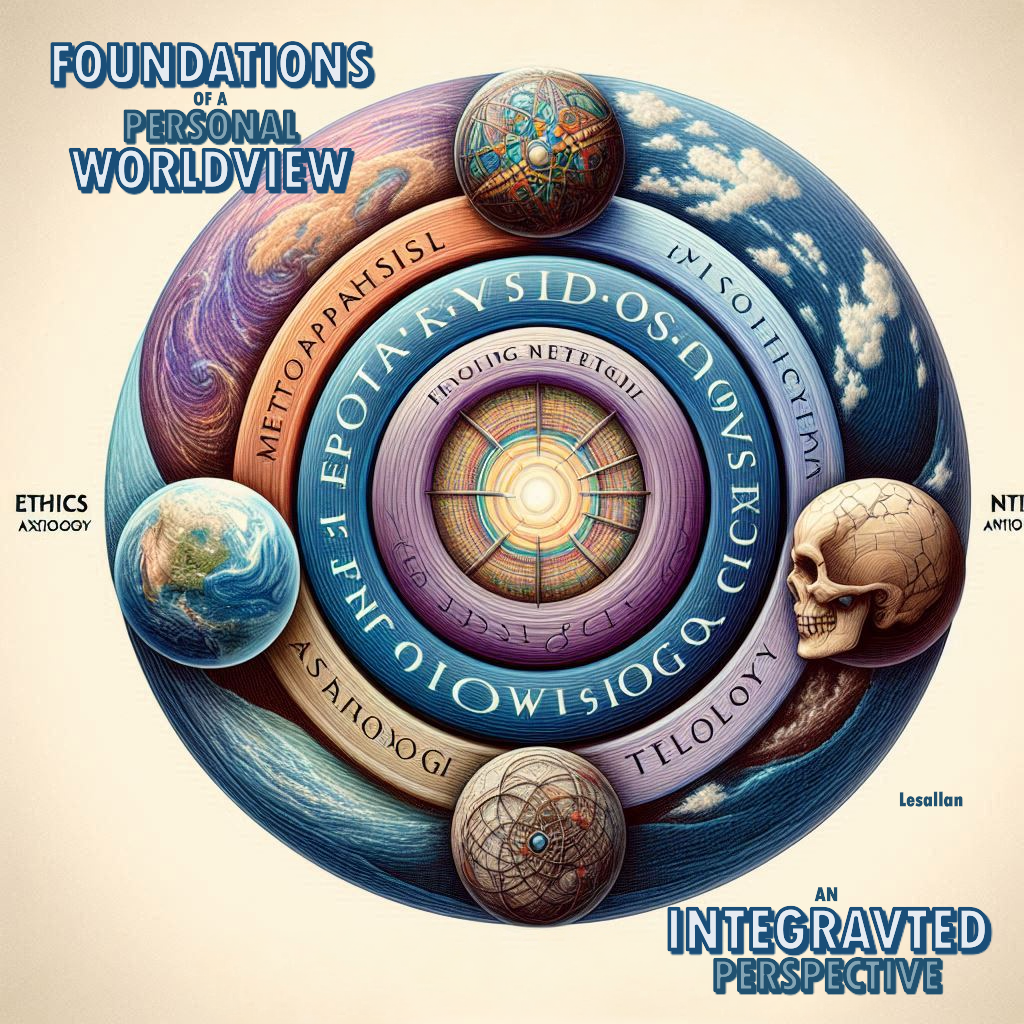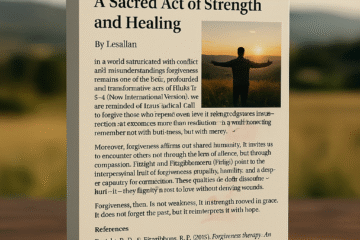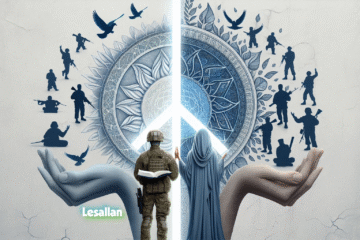Lesallan | April 12, 2025

Foundations of a Personal Worldview: An Integrative Perspective
A worldview is more than a collection of opinions; it is an intricate framework of beliefs that shapes how we interpret reality, make decisions, and respond to life’s ultimate questions. Every person—consciously or not—operates out of a particular worldview, which influences our behavior, ethics, and sense of purpose. In developing my worldview, I have drawn upon the insights presented in Nash’s “Life’s Ultimate Questions” (1999) and enriched my perspective by engaging with contemporary scholarship. In this paper, I will describe the five major components of a worldview—metaphysics, epistemology, ethics/axiology, anthropology, and teleology—and evaluate them using Nash’s (1999) four tests of internal coherence, experiential adequacy, existential relevance, and practical fruitfulness.
At the core of any worldview lies the question of reality, its nature, and its origins—and this is the realm of metaphysics. Reality encompasses more than the physical world; it includes spiritual and transcendent dimensions. Such a view accords with the notion that there is a divine or ultimate reality behind everyday life—a perspective supported by biblical teachings (e.g., Colossians 1:16, NIV) even as it is critically examined through reason. In my view, the interplay between the tangible and the transcendent helps answers the question of “what is real?” and serves as the foundation for the rest of my beliefs.
Equally critical is epistemology, the study of knowledge and how we come to know what we know. My approach to knowledge resembles a synthesis of empirical observation, logical reasoning, and revelatory insight. While science and experience provide reliable tools for understanding the physical aspects of life, individual experiences and spiritual reflections yield insight into more abstract, metaphysical realities. Nash’s emphasis on wrestling with life’s ultimate questions reminds us never to settle for superficial answers; instead, our beliefs must be constantly scrutinized, refined, and ideally, corroborated by both reason and experience. This blend of epistemic sources ensures that my worldview remains dynamic and responsive to new insights.
The next essential component is ethics—or axiology—concerned with what is valuable, honorable, and morally right. My worldview upholds the principles of compassion, honesty, and justice as fundamental. Ethical values are not arbitrarily chosen; they are the result of a complex engagement with cultural traditions, individual experiences, and spiritual insight. Biblical principles, for example, have long underscored the value of treating others with love and respect (cf. Matthew 22:39, NIV), while my individual experiences and academic study have highlighted the importance of practical ethics in everyday life. Similarly, contemporary research by Mifsud and Sammut (2023) indicates that social values significantly influence our belief systems, affirming that ethics is as much a social construct as a personal conviction. This reflective process strengthens my ethical stance and guides how I engage with others and contribute to the broader community.
Understanding human nature is another indispensable facet of any worldview. In this context, anthropology is not merely the study of human history or culture; it is a reflective inquiry into what it means to be human. Humans are inherently complex and endowed with creativity and vulnerability. Recognizing our inherent dignity and fallibility shapes a commitment to self-improvement, empathy, and cooperation. This perspective is deeply rooted in personal introspection and longstanding traditions of thought, arguing that while we possess tremendous potential for goodness, our limitations remind us of the need for continual growth. This dual awareness of capability and limitation fosters humility and mobilizes social responsibility and personal resilience.
The final major component is teleology or the question of purpose and destiny. My personal worldview contends that life is imbued with meaning and intentionality. Every event, whether joyful or challenging, contributes to a broader narrative that defines who we are and what we are meant to accomplish. Beyond mere personal ambition, I see life as a collective journey toward fulfillment and transcendence that aligns with the biblical notion of a divinely ordained purpose (see Proverbs 19:21, NIV). When transformed into action, this teleological understanding provides comfort and the drive toward achieving a meaningful existence in harmony with both personal calling and communal well-being.
In addition to outlining these five components—metaphysics, epistemology, ethics/axiology, anthropology, and teleology—it is essential to assess my worldview against Nash’s four tests. The first test, internal coherence, requires that all elements of a worldview be logically consistent. In my framework, the harmony between my belief in a transcendent reality and my commitment to empirical knowledge has been carefully balanced; I have strived to avoid contradictions by allowing each segment of thought to inform and reinforce the others. Second, the test of experiential adequacy is met as my worldview provides a robust explanation for life’s uplifting and painful experiences. By acknowledging both spiritual dimensions and human limitations, my perspective offers reassurance and meaning amidst life’s complexity. Third, the existential relevance test confirms that my beliefs address life’s poignant questions about origin, destiny, and morality, yielding reflective, satisfying, and deeply personal answers. Finally, the test of practical fruitfulness is the most compelling aspect: my worldview is not static but actively shapes how I interact with the world, make decisions, and respond to various challenges. It serves as a moral compass that encourages creative problem-solving and reinforces values that benefit both personal growth and social harmony.
Recent studies further reinforce the importance of developing a comprehensive and coherent worldview. For instance, Mifsud and Sammut (2023) argue that worldviews are fundamentally intertwined with social values and cultural contexts, suggesting that a personal belief system simultaneously reflects broader societal norms and an individual construct that guides behavior. Their research, addressing the dynamic relationship between belief and action, supports the notion that a well-formed worldview is theoretically sound and beneficial in navigating real-world complexity. This scholarly perspective resonates with Nash’s call to develop an intellectually rigorous and experientially grounded worldview, contributing to a fuller understanding of life’s ultimate questions.
In summary, my personal worldview is an interwoven tapestry of metaphysical beliefs, epistemological inquiry, ethical commitments, anthropological insights, and teleological aspirations. By examining these elements through Nash’s four evaluative tests—internal coherence, experiential adequacy, existential relevance, and practical fruitfulness, I have ensured that my perspective is robust, reflective, and capable of guiding real-world decisions. As I meet life’s challenges, I remain committed to refining my worldview through continuous learning, personal experience, and engagement with traditional and contemporary scholarships. Through this ongoing process, my worldview not only defines who I am but also empowers me to contribute meaningfully to the lives of others.
References:
Mifsud, R., & Sammut, G. (2023). Worldviews and the role of social values that underlie them.
Worldviews and the role of social values that underlie them. – APA PsycNet PLOS ONE, 18(7), e0288451
Nash, R. (1999). Life’s ultimate questions. Grand Rapids, MI: Zondervan.


